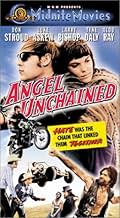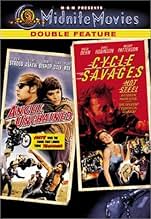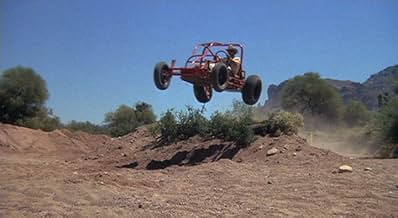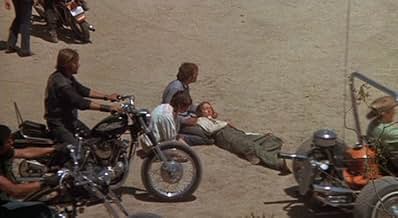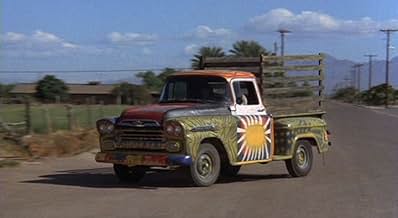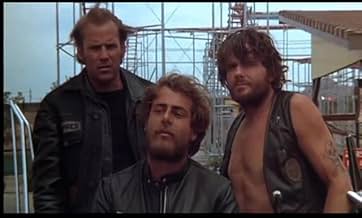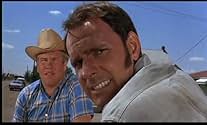Angel is the biker who joins a commune of hippies near a small town. When the town rednecks attack them, Angel calls up some of his bad biker buddies to exact revenge.Angel is the biker who joins a commune of hippies near a small town. When the town rednecks attack them, Angel calls up some of his bad biker buddies to exact revenge.Angel is the biker who joins a commune of hippies near a small town. When the town rednecks attack them, Angel calls up some of his bad biker buddies to exact revenge.
T. Max Graham
- Magician
- (as Neil Moran)
Jean Marie Ingels
- Jackie
- (as Jean Marie)
- Director
- Writers
- All cast & crew
- Production, box office & more at IMDbPro
5.1534
1
2
3
4
5
6
7
8
9
10
Featured reviews
Cowboys, Bikers and Hippies
After a rumble with another motorcycle gang one of the bikers named "Angel" (Don Stroud) decides it's time to leave and make it on his own. So he gives up his colors and drives off down the highway. It's at this time that he rides into a small town and while filling up at the local gas station comes upon two hippies who are subsequently denied service by some redneck cowboys who inhabit the area. He helps them out and to express their gratitude they invite him to stay at their nearby commune. Since he has nowhere else to go he takes them up on their offer. Unfortunately, after only a few days the rednecks come and destroy the crops that the hippies had worked all summer on after which the cowboys give them an ultimatum to leave or they will return in a week. So in desperation the leader of the commune who goes by the name of "Jonathan Tremaine" (Luke Askew) pleads with Angel to bring his old gang to help them out. Although he explicitly warns them about the potential danger these bikers could create they continue to insist so he then rides out to ask them. The bikers accept the invitation and all kinds of mayhem follows not long afterward. Now rather than reveal any more I will just say that this was an okay "biker film" which could have been better if it had flowed a bit more smoothly from one scene to another. In any case, I found it to be an adequate movie for the most part and I have rated it accordingly. Average.
Dune buggied rednecks
Jack said the rednecks are on "Go-Carts". I own the movie and watch it every few years or so. They are driving dune buggies. A far cry from go carts. I think the movie is great! Very unrealistic which helps make it great. I collect cheap biker movies and this well qualifies. Unrealistic is letting a fellow club member leave so he can get his head together. You gotta have a better reason for leaving any outlaw club. Usually it's prison or death. Just taking off don't cut it. Having a tripping Indian with trippy cookies is a first. Usually outlaws will do some things for cash. These "Bros" go for "cookies"! God bless 'em! Next they will be killing for apple pie. Yes, you could find better things to do with your time than watching this. Usually crushing your fingers in a vise or sticking your face in a fan is more entertaining. If you love cheap biker movies (and vintage dune buggies) you will LOVE this pile.
Cheapo biker flick is likable despite itself
Released in 1970, "Angel Unchained" features Don Stroud as an Arizona biker who decides he's had enough of the biker lifestyle. He roams off and ends up at a hippie commune where he hooks up with a young Tyne Daly. It doesn't take long for redneck cowboy dune buggy riders to enter the picture (I'm not making this up). They try to chase the hippies away so Stroud goes back to his biker buddies to enlist them to help stave off the rednecks.
"Angel Unchained" is definitely a low Grade "B" flick. You'll observe this right off at the silly carnival brawl sequence. This is not top-notch filmmaking, that's for sure. Despite this, after about 30-40 minutes I strangely started getting involved in the story; I actually started caring about the characters and what would ultimately happen, even though I shouldn't have. The bikers are depicted as wild outcast revelers who drink and use drugs, but they're generally likable at the same time. The scenic Arizona locations are a highlight.
The end credits showcase each actor individually in that dramatic way that used to be popular (e.g. "The Dirty Dozen"); all it did for me was make me bust out laughing. NOTE TO THE FILMMAKERS: It wasn't a good or serious enough film to warrant this type of venerable closing.
BOTTOM LINE: "Angel Unchained" wasn't made very well or very seriously; however, if you make the necessary psychological adjustments and give it a chance (i.e. 30-40 minutes of your time), it's fun, likable, entertaining and even a mite engrossing. I shouldn't like it, but I do. Go figure.
The film runs 86 minutes.
Grade: C+
PS: If you want to see a great late 60's/early 70's biker flick, catch the very first one, the infamous "The Wild Angels" from 1966 starring Peter Fonda, Bruce Dern, Nancey Sinatra and Diane Ladd. "The Wild Angels" is simultaneously shocking and profoundly brilliant (yes, even though it's essentially a Roger Corman 'B' film). See my review for full details.
"Angel Unchained" is definitely a low Grade "B" flick. You'll observe this right off at the silly carnival brawl sequence. This is not top-notch filmmaking, that's for sure. Despite this, after about 30-40 minutes I strangely started getting involved in the story; I actually started caring about the characters and what would ultimately happen, even though I shouldn't have. The bikers are depicted as wild outcast revelers who drink and use drugs, but they're generally likable at the same time. The scenic Arizona locations are a highlight.
The end credits showcase each actor individually in that dramatic way that used to be popular (e.g. "The Dirty Dozen"); all it did for me was make me bust out laughing. NOTE TO THE FILMMAKERS: It wasn't a good or serious enough film to warrant this type of venerable closing.
BOTTOM LINE: "Angel Unchained" wasn't made very well or very seriously; however, if you make the necessary psychological adjustments and give it a chance (i.e. 30-40 minutes of your time), it's fun, likable, entertaining and even a mite engrossing. I shouldn't like it, but I do. Go figure.
The film runs 86 minutes.
Grade: C+
PS: If you want to see a great late 60's/early 70's biker flick, catch the very first one, the infamous "The Wild Angels" from 1966 starring Peter Fonda, Bruce Dern, Nancey Sinatra and Diane Ladd. "The Wild Angels" is simultaneously shocking and profoundly brilliant (yes, even though it's essentially a Roger Corman 'B' film). See my review for full details.
Not too bad biker flick
Angel Unchained tells the story of Angel, the loner who leaves his club for the hippy commune. Local townies (actually cowboys in dune buggies) are out to drive the long hairs away, so Angel asks his biker buddies for protection. It's The Seven Samurai on choppers, but these warriors aren't in it for honour, money, or prestige...they only want the potent 'wammo' that the hippie's medicine man puts into chocolate chip cookies(presumably it's Peyote, but the script takes care not to be too descriptive). Acting honours go to Don Stroud as Angel, there's a young Tyne Daly on hand to 'do her thing', Luke Askew is good as commune leader Tremaine, and Aldo Ray has about five minutes of screen time--most of it reclining in a chair--as the local sheriff. Plenty of action, and a lot less profanity and nudity than you would expect from one of these AIP quickies.
Hippies and Bikers
Angel (surfer Don Stroud, "The Amityville Horror") is a biker who joins a commune of hippies near a small town. When the town rednecks attack them, Angel calls up some of his bad biker buddies to exact revenge.
This is more or less exactly what you would expect from a movie that combines hippies with bikers. They simply do not get along well, despite both of them being anti-establishment and pro-drug. (We saw a similar yet different encounter in "Easy Rider".)
Was this a good film? Maybe. I mean, I am not going to go out and tell people to watch it. But as far as some good old-fashioned American International Pictures fun goes, this is another AIP film that you can just relax to. No thinking involved.
This is more or less exactly what you would expect from a movie that combines hippies with bikers. They simply do not get along well, despite both of them being anti-establishment and pro-drug. (We saw a similar yet different encounter in "Easy Rider".)
Was this a good film? Maybe. I mean, I am not going to go out and tell people to watch it. But as far as some good old-fashioned American International Pictures fun goes, this is another AIP film that you can just relax to. No thinking involved.
Did you know
- TriviaThe biker gang extras, were the Arizona Dirty Dozen bike club. They were cowboys returning from the Vietnam War.
- ConnectionsFeatured in Dusk to Dawn Drive-in Trash-o-Rama Show Vol. 3 (1996)
- SoundtracksFollowing A Dream
Sung by Randy Sparks and Karon Rondell
- How long is Angel Unchained?Powered by Alexa
Details
- Release date
- Country of origin
- Language
- Also known as
- Angels Unchained
- Filming locations
- Mesa, Arizona, USA(Lehi Market)
- Production company
- See more company credits at IMDbPro
Box office
- Gross US & Canada
- $69,250
- Runtime
- 1h 26m(86 min)
- Color
- Aspect ratio
- 1.85 : 1
Contribute to this page
Suggest an edit or add missing content


